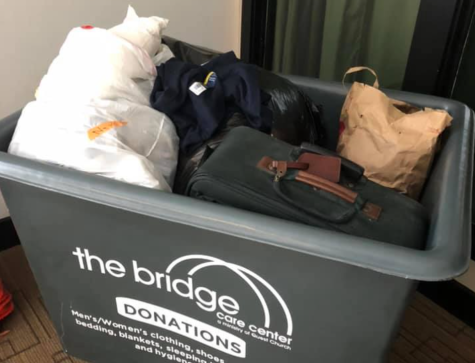Simple gestures go a long way
What I have learned from the unhoused community
January 20, 2022

In my four years of experience volunteering at the Bridge Care Center in Ballard, I have gotten to know many different people in the unhoused community.
The Bridge Care Center is a place where people in need can come to get donated clothing. Case workers are also available to help them find resources such as healthcare, job applications and access to the internet. Volunteers at the Bridge Care Center, like myself, get to help people find clothing as well as keep the center organized and clean.
Everyone who comes into the Bridge Care Center has a different story of how they ended up in their particular situation, but everyone I’ve talked to has something in common – they wish people treated them with dignity.
Oftentimes, when an unhoused person is out on a corner, people pass them by without saying a word. Many people pretend they do not even exist; eyes forward, intentionally avoiding eye contact. Imagine how dehumanizing this would be – day after day, people pretending you are no more than a rock on the sidewalk.
Many of the clients at the Bridge Care Center have expressed that a smile or a ‘good morning’ can go a long way – a simple gesture, yet one that shows a person that you recognize their shared humanity, that tells them that they exist and that they matter.
All humans deserve to be treated with dignity and respect.
Something else that I’ve learned from my conversations is that houselessness can truly happen to anyone. It is easy to sit back and assume that a person without a house did something to deserve their situation. However, this is not the case. People have situations where they do have a place to live, but then something happens. A family member gets sick, a natural disaster occurs, a job is lost.
For example, one person I talked to got very sick. They lost their job, and slowly lost their possessions as well, including their house, because of the astronomical cost of their medical bills. For people with little or no support system, they may have nowhere else to go and they end up living outside.
It is important for us to recognize and acknowledge that houselessness is not a moral failure. In addition, we need to recognize that it could just as easily be us in that position of losing everything. We often think of houselessness as the consequences of someone’s poor choices. Instead, houselessness is usually just the cumulation of a set of unfortunate circumstances that could happen to anyone.
In Seattle, there is a lot of discourse about houselessness – most of the time framing the houseless community as the problem. One statement that has always really bothered me is ‘We need to do something about this homeless problem!’
People who are homeless are not the problem. Lack of affordable housing is the problem. According to The Seattle Times, the median cost to buy a house in Seattle was $896,500 in 2021. Average rent for a one-bedroom apartment was $1760 at the end of 2021, according to Zumper. Having rent caps and building more affordable housing could help.
People who are homeless are not the problem. Lack of accessible mental health care is the problem. According to Mental Health America, Washington ranks #46 out of 51 in mental-health care, indicating that there is a higher proportion of people suffering from mental illness than in other states and less mental-health care available. Because the cost of mental-health care is so high, one possible solution is to provide more opportunities for affordable mental-health care.
People who are homeless are not the problem. Criminalizing addiction is the problem. John McKay, a former attorney for the Western District of Washington, writes in The Seattle Times that, “A focus on recovery will result in safer and healthier communities.” Instead of throwing people in prison for using drugs, providing health care, rehabilitation and helping them to get back on their feet would allow for more people to be able to find a place to live.
May we learn to treat each person we meet with the dignity and respect that is inherent to all humans. May we unlearn the fear that we were taught about people who are different from us. May we strive to be a community that instead of trying to ‘clean up our city,’ tries to clean up our hearts instead.
If you are looking for a way to help Seattle’s unhoused community, The Falcon is hosting a sock drive from Jan. 20 to Feb. 10. Socks will be donated to local homeless encampments. Donation bins can be found in 2nd floor Weter and the lobbies of Ashton, Hill, Arnett and Emerson.
























































































